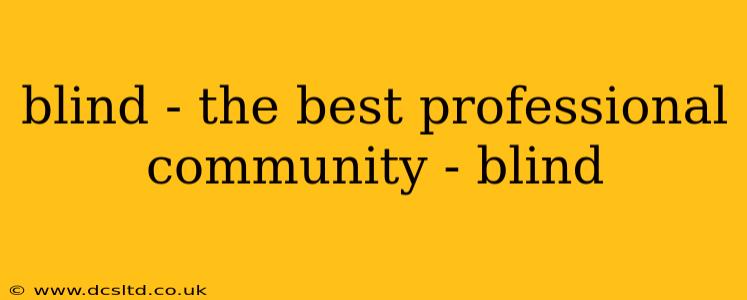Blind is a popular app and website known for its anonymous workplace reviews and discussions. But is it truly the best professional community? This in-depth analysis explores Blind's strengths and weaknesses, examining its features, user experience, and overall impact on the professional landscape. We'll also tackle some frequently asked questions to provide a comprehensive understanding of this unique platform.
What is Blind, and How Does It Work?
Blind is a social network built around professional verification. Users connect their work emails to verify their employment at a specific company, guaranteeing a certain level of authenticity within the community. This verification, however, is the source of both its strength and its controversy, as we'll explore later. Once verified, users can access company-specific threads and participate in anonymous discussions about salaries, company culture, management, and a wide range of other workplace topics. The anonymity allows users to share honest opinions without fear of reprisal, theoretically fostering open and frank communication about sensitive issues rarely discussed openly.
Is Blind Really Anonymous? Addressing Privacy Concerns
While Blind promotes anonymity, the verification process raises questions about the extent of true privacy. Linking your work email, even if it's ostensibly for verification, introduces a potential risk. While Blind claims strong data protection measures, some users remain skeptical, particularly regarding potential data breaches or the possibility of identification through indirect means. This is a critical factor to consider when evaluating Blind's position as the "best" professional community – the very feature enabling open discussion also introduces a potential vulnerability.
How Does Blind Compare to Other Professional Networking Sites?
Blind differentiates itself from platforms like LinkedIn by focusing exclusively on anonymous, company-specific discussions. LinkedIn, while offering professional networking opportunities, tends to be more focused on career advancement and public image. Blind, in contrast, provides a space for candid, unfiltered feedback, which can be both valuable and potentially damaging depending on the context. This difference makes it neither superior nor inferior to LinkedIn, but rather a complementary platform serving distinct needs within the professional world.
What Are the Benefits of Using Blind?
- Unfiltered Feedback: Blind offers a rare opportunity to gain insights into company culture, management styles, and compensation directly from current and former employees.
- Salary Transparency: Discussions about salaries are prevalent on Blind, potentially helping users negotiate better compensation packages.
- Networking Opportunities: While anonymous, Blind can facilitate networking through shared experiences and insights.
- Early Warning Signs: Identifying potential problems within a company or industry can be easier on Blind, allowing users to make informed career decisions.
What Are the Downsides of Using Blind?
- Potential for Misinformation: Anonymous postings lack accountability, making it difficult to verify the accuracy of information.
- Toxicity and Negativity: The anonymity can embolden negative or inflammatory comments, creating a potentially toxic environment.
- Privacy Concerns: As previously discussed, the verification process raises legitimate privacy concerns.
- Echo Chambers: Company-specific forums can sometimes create echo chambers where biased opinions are amplified.
Is Blind a Safe and Ethical Platform?
Blind's safety and ethical implications are complex. The platform's terms of service prohibit harassment and hateful content, but enforcing these rules on an anonymous platform presents significant challenges. The potential for misuse, including spreading misinformation or engaging in harmful gossip, necessitates a critical approach to the information found on the platform. Users should exercise caution and consider the source before accepting any information as factual.
How Can I Use Blind Effectively and Safely?
To maximize the benefits of Blind while mitigating the risks, consider the following:
- Treat Information with Skepticism: Don't accept everything you read at face value. Cross-reference information with other sources whenever possible.
- Focus on Trends, Not Individual Posts: Pay attention to recurring themes and patterns rather than isolated negative or positive comments.
- Engage Respectfully: If you participate in discussions, do so respectfully and avoid contributing to negativity.
- Be Mindful of Privacy: Remember that even with anonymity, your participation on Blind could have unintended consequences.
Conclusion: Is Blind the Best Professional Community?
Whether Blind is the "best" professional community depends entirely on your priorities. If you value unfiltered, anonymous feedback and are comfortable with the inherent risks of an anonymous platform, Blind can be a valuable resource. However, if privacy is paramount or you prefer more controlled and verifiable information, other platforms might be a better fit. Ultimately, Blind is a powerful tool with both significant benefits and potential drawbacks that users must carefully weigh before engaging.
